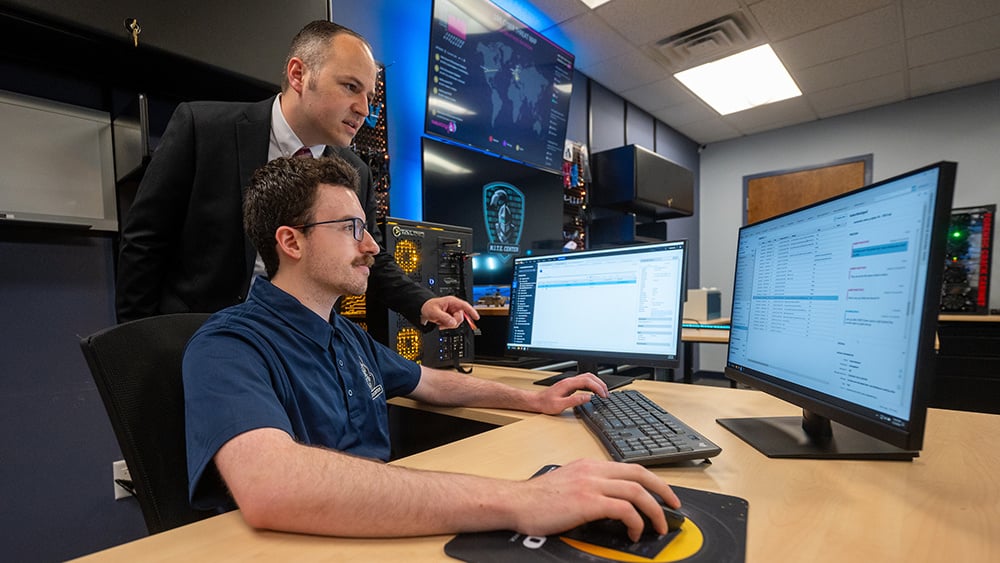
Detective Joe Walsh and Matt Revelas in the forensics lab.
The new digital forensics lab (the N.I.T.E. Center) just opened on May 2, and it’s already a hit with students. Eight interns signed up for summer work to help local law enforcement solve a variety of crimes, and they have been busy.
According to a summary of cases, provided by Detective Joe Walsh, director of the lab, students have assisted with investigations of a missing person (an Aston man, whose body was eventually found in Springton Reservoir) as well as homicides, robberies, burglaries, internet scams, stalking, motor vehicle accidents, and more. They get about five new cases each week.
The interns staff the lab from Monday to Friday, each working about 15 to 20 hours per week. “Working on real criminal cases is valuable experience, especially for students who major in cybersecurity and digital forensics,” says Walsh.
It has been an eye-opening introduction to ideas that the summer 2024 interns can apply in the classroom and the workplace. All eight -- Brendan Boyer, Dalton Cannon, Alex Lavin, Matthew Randall, Matthew Revelas, Nadirah Roberts, Rob Smith, and Jenna Wurtzbacher – have learned valuable lessons.
“One of the most surprising things I've learned about law enforcement is how much time it really takes to solve a case,” says Wurtzbacher, a psychology major. “That's one thing I love about the lab. We can help local law enforcement with crimes in real time, saving them some time in their lengthy investigations.”
Lavin is thankful that he is getting hands-on experience in his field and learning that digital forensics requires restraint. “What I mean by this,” he explains, “is that with the tools that we use, it is very easy to look at data that is outside the area of your search warrant.”
Roberts, a criminal justice major, enjoys collaborating with her fellow interns. “Each day we all come together to discuss, theorize, and search for answers when it pertains to a case, and we learn so much valuable information from one another.”
She adds that she has been surprised by the usefulness of electronic evidence. “Throughout the cases we have worked on, I have seen how information derived from phones and the internet have provided so much relevant data that has solved and quickened law enforcement's response time to crimes.”
Revelas, a cybersecurity major, agrees. “The most surprising thing I have learned during this internship would be the amount of data that is still accessible after it has been deleted” or even if the device has sustained a significant amount of damage.
Patience, restraint, collaboration, and determination. All learned during one summer internship.
Funded by a federal grant of $258,000, the forensics lab gives law enforcement throughout the county the tools to investigate crimes quickly – by analyzing seized digital devices, examining video surveillance recordings at crime scenes, and monitoring live video cameras during real-time crime.
Cutting-edge technology in the new facility includes a $15,000 Sumuri computer that is custom-made for forensics; a Faraday box to isolate and preserve seized cell phones and laptops; license plate reader software; and three large monitors (one measuring 65 inches) to view video feeds.
 CHALLENGE
CHALLENGE





